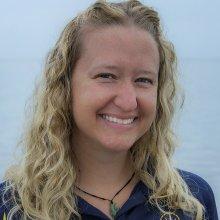
Lindsay Knippenberg
Tell us about your work / research. What kinds of things do you do?
I am a high school science teacher at Mooresville Senior High School in Mooresville, North Carolina where I teach Marine Science and Environmental Earth Science. Beyond my teaching responsibilities, I serve as an advisor for several clubs, facilitate a program to bring STEM into the lower elementary grades, and I am a coach for the girl's soccer team. Prior to Mooresville, I taught for seven years outside the city of Detroit, MI and was an Albert Einstein Distinguished Educator Fellow for two terms with the NOAA Office of Education in Washington, DC.
What sparked your initial interest in your career?
Growing up I was always the kid with a million questions and I was happiest when I was outside exploring the world around me. That love for gaining an understanding of the natural world led me to pursue a degree in science. As I got more and more involved in scientific research I learned that I liked telling people about science and sharing my enthusiasm more than I liked conducting the actual research. Being a classroom science teacher and also being involved in teacher research experiences has been the perfect blend of science and communications and I love my career.
Who influenced you or encouraged you the most?
I have had several teachers throughout my life who have influenced me and have served as role models. In high school I had a teacher who emphasized project based learning and brought her summer research experiences into the classroom. It inspired me and I absolutely loved the class and I have used this as model for how I want to teach.
What element of your work / study do you think is the most fascinating?
My passion is inspiring the next generation of scientists by connecting them to scientists and real-time data. I love using ocean exploration in my classroom because there is still so much that we don’t know about our planet and it is inspiring to my students to know that they can be the ones to make those new discoveries.
What other jobs led you to your current career?
As an undergraduate I participated in a Research Experience for Undergraduates (REU) program at the University of Alaska-Southeast. It was an amazing experience and sparked my love for field research and communicating science. I also was an Albert Einstein Distinguished Educator Fellow with the NOAA Office of Education. It was first experience communicating marine science and I have been hooked since.
What are your degrees and certifications?
I have a Bachelor of Science in Biological Sciences from Michigan State University and a Masters of Science in Environmental Science from the University of Michigan-Dearborn.
What are your hobbies?
I love anything that involves me being outside…camping, hiking, swimming, kayaking, traveling, nature photography, etc.
What advice would you give someone who wants to have a career like yours?
For someone that wants to be an educator, I would tell them to never stop being a learner. We still have so much to learn about ourselves and our planet that it is imperative that educators continue to be both teachers and learners. Throughout my career I have been involved in several teacher research experiences and those experiences have rejuvenated me, inspired my students, and made me a better teacher.
How did you get involved in the Nautilus Exploration Program? How did you get on the ship?
I applied to be a Science Communications Fellow (SCF) after hearing a past SCF talk about their amazing experience at a NSTA conference and I knew that I had to be an SCF too. I was accepted into the program and since then I have returned to the ship as a Lead SCF and now as a Honors Research Program (HRP) Lead.
Expeditions
Lindsay participated in the following Ocean Exploration Trust expeditions:
